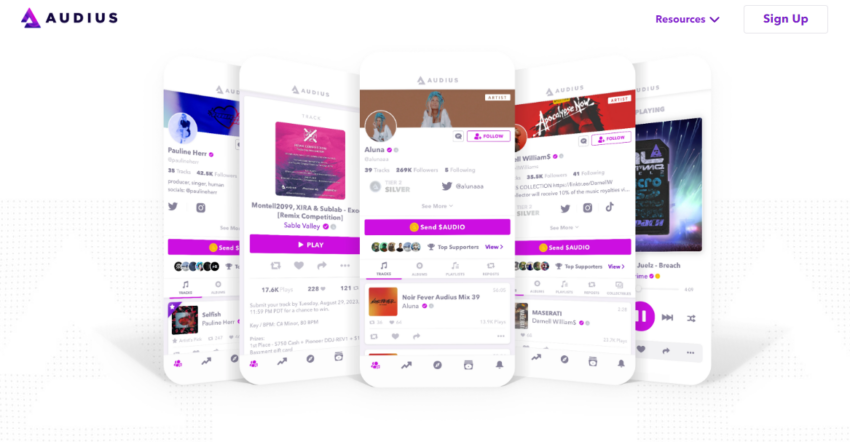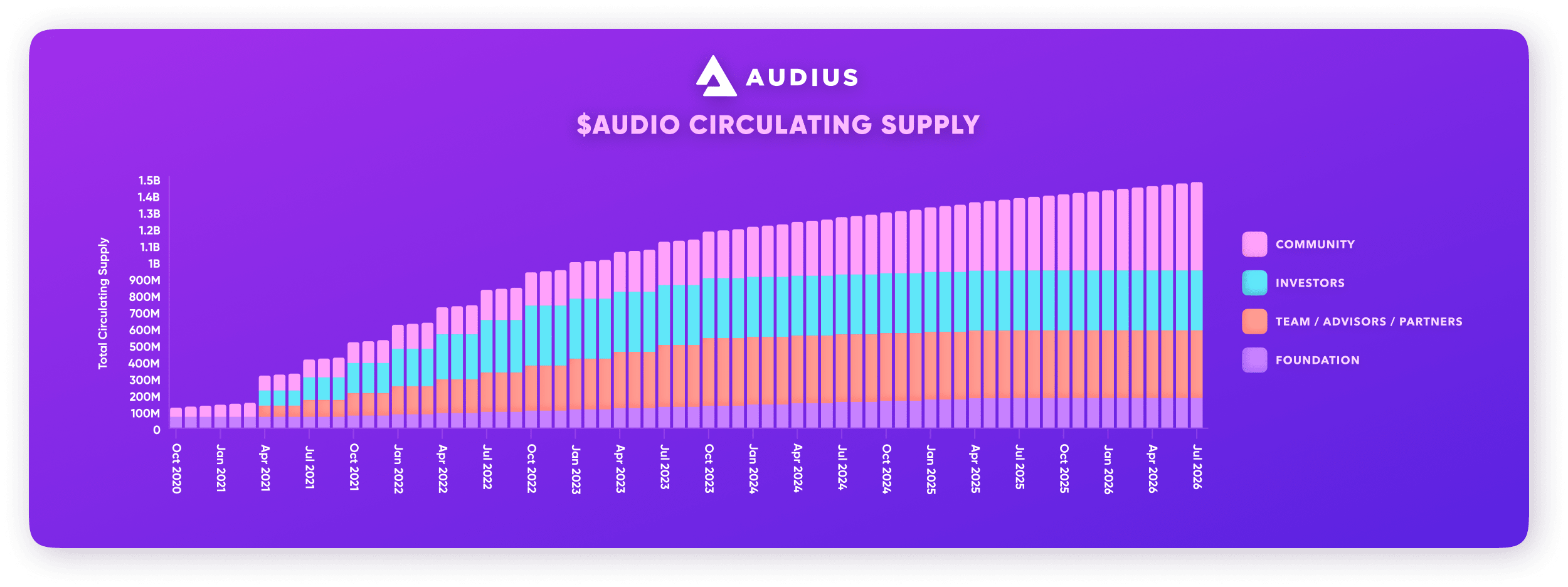Audius (AUDIO) is taking advantage of the blockchain to develop decentralized music streaming solutions. It is a cryptocurrency that monetizes music streaming and is accessible to many artists. Audius provides an interesting alternative to traditional music industry models. Let’s take a look at how exactly Audius and the AUDIO token intend to do this.
KEY TAKEAWAYS
➤ Audius is a blockchain-based platform that allows artists to monetize their work directly through AUDIO tokens, bypassing intermediaries.
➤ The AUDIO token bootstraps the platform by enabling payments, staking for rewards, and community governance.
➤ Audius empowers independent artists with flexible monetization options and partnerships, like integration with TikTok for broader exposure.
➤ While competing with platforms like Opulous, Spotify, and Apple Music, Audius focuses on serving independent artists.
What is Audius?

Audius is a blockchain-powered music streaming service that allows users to directly support artists with AUDIO tokens. It is run by an open-source community, including fans, artists, and developers.
Unlike other music streaming platforms, the number of track plays does not determine artists’ proceeds. Audius gives artists the flexibility to make money as they see fit. This may be through the sale of unique NFTs or by some other means.
The Audius whitepaper, published in late 2020, argues that the network gives the power back to artists, cutting out the numerous intermediaries that take a share of artists’ revenue.
On the face of it, the concept works, allowing customers (holders of the AUDIO token) to pay artists directly rather than their record label, management, or anyone else who may take a cut.
Audius struck a partnership with TikTok, enabling artists who have a presence on both platforms to take their music and incorporate it into their TikTok content. This was a way to allow artists greater exposure and bring Audius to a mainstream audience.
History of Audius
Audius was founded by Roneil Rumberg and Forrest Browning in late 2020. The development itself began in May 2018. Having gained the backing of Binance Labs and Coinbase Ventures in October 2020, around the time of the mainnet launch, it now has the confidence of the big players in crypto. But where did it all start?
Despite launching an initial version in 2018, the duo behind the platform were already facing difficulties and criticism. Regardless of the purpose of the platform — to allow independent artists to upload, host, and monetize their music — there was also a problem with pirated material.
The nature of the platform allowed users to upload copyrighted material from major artists. This allowed them to generate income from unauthorized content by the artists.
Since then, Audius has brought in a community arbitration system to moderate content, tackling this very problem. This has meant that those uploading pirated content should not be able to earn the AUDIO token, as had previously been the case.
In 2018, the team released the initial whitepaper. A very early version of the product was also launched. Later that year, the Audius team gave an initial group of testers the first version of the product to test and provide feedback.
Following this phase and its improvements, the project welcomed its first users outside the initial group. In the months after, it developed an extensive range of new features. By the end of the testnet phase, the platform had over 500,000 monthly users.
Audius vs. competitors
While a fairly niche concept, Audius still has to compete with mainstream music services like Spotify and Apple Music. One of the most developed of these is Opulous, which allows music creators to take part in blockchain-based services. Opulous allows music artists to:
- Convert their music rights into NFTs. This allows fans and investors to purchase fractional ownership in the revenue they generate.
- AI-powered revenue predictions allow forecasting of future royalties, which helps investors make informed decisions.
- Artists can access funding through peer-to-peer loans backed by their music assets. This provides an alternative to loans made by record companies, which may retain ownership of said assets after the loan is repaid.
There are differences between the two, a big one being supported platforms. Between the two, only Audius has a desktop app. This extra capability is useful for those who want flexibility in how they enjoy their music.
Both platforms are impressive. Audius’ features are more tailored to independent artists, while Opulous may be better for more popular artists because it focuses on the money-making element of music.
| Platform | Token | Revenue model | Unique feature |
|---|---|---|---|
| Audius | AUDIO | Token-based rewards | Community governance |
| Opulous | OPUL | DeFi loans and crowdfunding | Tokenized music rights |
| Spotify | N/A | Subscription and ad-based | Discovery algorithms |
| Apple Music | N/A | Subscription-based | Apple ecosystem integration |
AUDIO tokenomics

Audius uses the AUDIO token to keep users incentivized to use their platform. Staking AUDIO tokens rewards the user and improves the services that Audius provides.
Node operators can stake tokens to ensure Audius’s security and keep it running smoothly. Meanwhile, everyday users of the platform can stake their tokens for exclusive content and features that will, no doubt, keep them engaged.
Staking these tokens also means that you have a stake in the future of the protocol, shaping its future. As the platform grows, users will be able to stake their tokens, including artists’ tokens, to receive the monetary benefits of their favorite artists’ success.
Should you buy the AUDIO token?

Audius and its associated token doesn’t seem set up for long-term investment. Rather, users can stake their AUDIO tokens for their favorite artists. It is, instead, part of a payment system for the next generation of music streaming services.
The project cuts out record companies and distributors. This may appeal more to independent artists, allowing fans to give more of their money (even in the form of cryptocurrency) directly to artists.
The AUDIO token has been down since its all-time high and year-to-date (YTD), which may raise concerns among investors. However, as stated previously, this is not necessarily an indictment of the platform itself, as the token’s primary use case is payments and governance.
What does the future hold for the AUDIO token?
It is hard to imagine the AUDIO token becoming something like Bitcoin. It isn’t a token that will result in great personal profit. However, the AUDIO token and Audius could play a major part in investing in upcoming artists. While it does have competitors, these have all taken a slightly different angle as to how to approach music and the blockchain. It will be interesting to see where each effort goes.
Frequently asked questions
What is Audius?
How does Audius work?
What are the benefits of using Audius?
Disclaimer
In line with the Trust Project guidelines, the educational content on this website is offered in good faith and for general information purposes only. BeInCrypto prioritizes providing high-quality information, taking the time to research and create informative content for readers. While partners may reward the company with commissions for placements in articles, these commissions do not influence the unbiased, honest, and helpful content creation process. Any action taken by the reader based on this information is strictly at their own risk. Please note that our Terms and Conditions, Privacy Policy, and Disclaimers have been updated.



